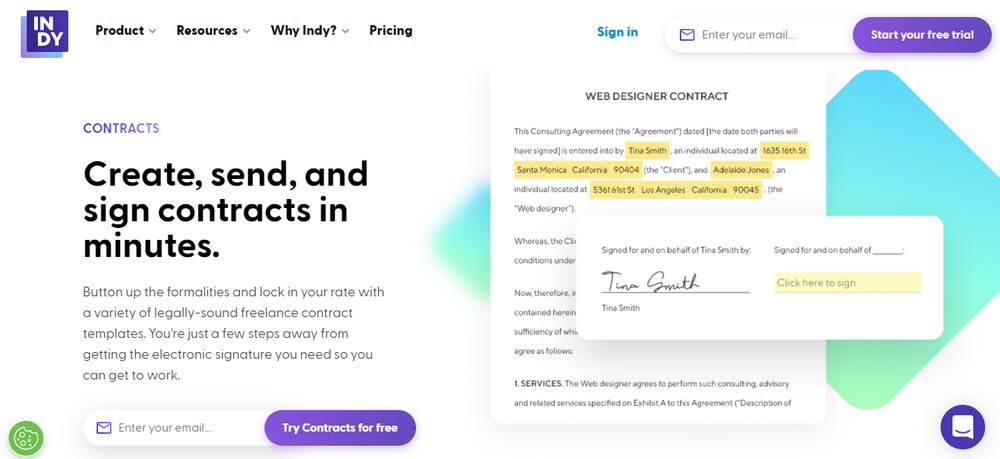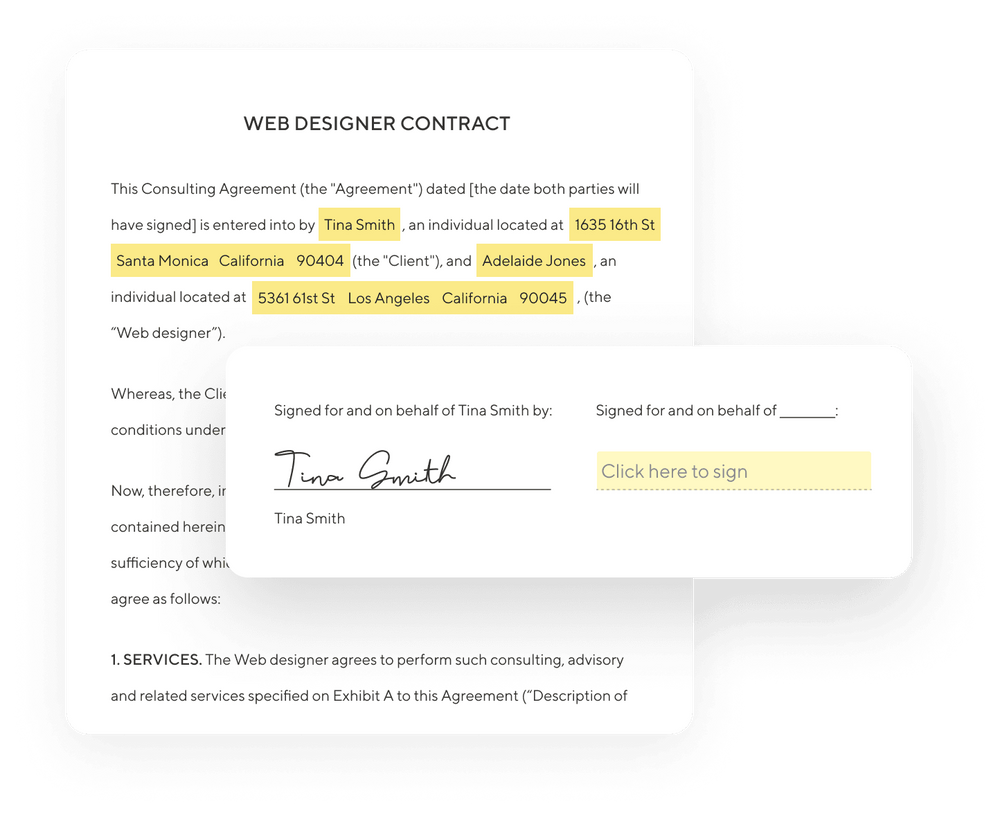Whether you’re an established freelancer or new to the game, it’s highly likely that at some point, you’ll come across the terms ‘hourly rate contacts’ and ‘fixed-term contracts.' As an independent contractor, you’re going to have to decide which type of independent contractor agreement is going to be best between you and your clients in order to keep everyone happy.
But what are the benefits of an hourly contract, and how should you know when to offer one? In this article, we’re here to determine what this type of contract is, how you can benefit from it, and what kind of work you might include in this type of freelancing agreement.
What is an hourly rate contract?
To begin with, it's important to define exactly what an hourly rate contract entails. It’s no surprise here that the clue is in the name. An hourly rate contract is a legal agreement between the independent contractor and the client, in which the freelancer bills their time per hour.
An hourly rate contract differs from a fixed-term contract, or fixed-term price, in which the freelancer quotes their client for the entire project cost. When taking on additional work, weighing up which type of contract is going to suit you and your client best should be your first consideration.
The beauty of freelancing is that you can decide on your own terms for your services. However, there are going to be instances in which following some guidelines around hourly contacts are going to help you get the best financial rewards. We’re here to explain exactly how hourly rate contracts can benefit you – and how you might look to incorporate these into an agreement.
Why should I consider an hourly rate contract?
As an independent contractor, getting assigned a new project is always exciting. There’s nothing better than establishing a new relationship with a client and offering them your high-quality services. However, quoting the cost for a project can be tricky. It can be tempting to charge a fixed project cost for the work that you plan to do.
However, it's important to consider how long you think the project is going to take you. In the world of freelancing, it's not uncommon for tasks to take much longer than expected, with many projects throwing up unexpected curveballs or clients who require additional services along the way. In addition, if you particularly enjoy working on the project, those extra minutes spent on it can soon turn into hours, and this will all be at your own expense.

Before you know it, you could end up spending much longer than you had initially accounted for in your fixed-term fee. In this situation, charging your client per hour from the beginning provides an ideal solution.
This type of independent contractor agreement has a whole range of benefits. First, it means they will pay you for every bit of time spent on it, including the added extras that inevitably pop up along the way. It can be tricky to estimate the definite time that you will have to spend on the project beforehand - especially if it's a big one.
What are the pros and cons of an hourly rate contact?
Before deciding upon the type of agreement you want to offer, doing some thorough research into how hourly contracts work is the best place to start. Let's start by weighing up some advantages:
- Hourly contracts ensure you are paid for all the time you are working, meaning you don't end up putting extra hours in without being properly paid for it. Those odd extra minutes on a project here and there can really add up throughout larger projects, and not properly charging for these will be gradually incurring overhead expense costs, decreasing your hourly rate. As a freelancer, you need to value your time and expertise, as well as the quality of the outcome.
- If you're properly paid for your time and effort, it will naturally lead to better satisfaction in the work you are doing. When both you and your client are happy with your professional arrangement, the quality of your work will probably be better, knowing that each of your hours is appreciated.
- For most independent contractors, hourly rates can feel like a secure agreement. In the world of work, contracts are often agreed upon by the hour, so this type of agreement won't be an alien suggestion to your client.
- Since your client will be clear from the start about how they are paying you per hour, it allows them the flexibility to ask for extra work or additions to the project they might think of along the way. If they have already agreed to a fixed term cost, some clients might feel awkward asking you to do additional changes.
- If you conduct additional changes along the way, these can be easily billed without having to re-quote the entire project. This can be extremely frustrating to both parties otherwise. With this flexibility to make amendments and improvements, the overall outcome of the project is likely to be higher quality, and your client will feel they have got the very best from your services.
It's important to weigh up some cons of hourly contracts too.
- An obvious disadvantage of hourly contacts is that costs can build up from the client’s perspective. Whilst it’s great to spend as much time as possible on a project for the best results, these extra hours can add up, and a client might end up spending more than initially planned on one project.
- With this in mind, for clients who are conscious of budgets, hourly contracts can be a concern. This is because, at the start of the project, it's not clear exactly how much the entire job will cost. Whilst these contracts allow for flexibility, they might not be ideal for clients who are sticking to tight and specific budgets.
- In this instance, a brilliant solution is to cap the hours at a certain amount each week, to ensure that clients are staying within the realms of their budget—and independent contractors can also know the parameters of how much time they might be spending.
When should I charge by the hour?
A great place to implement an hourly contract is with a new client or with a project you haven't worked on before. You might be unsure how long the entire job is going to take, or how many alterations the client is likely to make along the way. Hourly rates offer excellent protection for most contractors to ensure you are properly paid for your hard work and time.
What should I include in an hourly rate contract?
You should always seek prior written consent before getting started on contract work. We've outlined some important factors to consider when setting up an hourly contract agreement. It's crucial to establish a written agreement between yourself and the client with all information relating to your services in one place.
With these handy tips, you and your client can stay on the same page throughout whilst preparing for any mishaps that may occur along the way.

Personal details
One of the most fundamental parts of your agreement should include personal information such as the contractor’s name. This will also include your name as the independent contractor and your client's name.
Don't forget to include the start date. Try to include as many specific details as possible here and proofread it afterward to avoid any errors.
Services performed
One of the most important details of your contract is going to include details of the work you are going to complete. It's vital that both parties acknowledge what your services are going to achieve in the time frame.
In this section, include everything that you are going to do for the client, including specific deliverables that you are going to complete and what the finished project will comprise. Again, detail is everything. Being straight up with your clients and being clear on their expectations from you from the start is going to save you any hassle along the way.
Timeframe
Next, provide details about when you are going to achieve each milestone in the project. This will give your client a good idea of how long they can expect the project to take and when they will receive the finished project. You might want to offer a rough estimate of how many business days the project might take. Such information should always be clarified in writing.
Remember, your client might be part of a production line too, so being clear on when they can expect the outcome is going to help everyone out.
Payment information
Naturally, this stage is fundamental to the entire agreement. Here, you need to outline your hourly rate and how much any additional extras are going to cost the client.
Be clear in your agreement on when you expect payment following your invoice and how you wish to be paid. Make sure your client has your payment details to save any hassle further down the line.
Changes and revisions
As an independent contractor, organization is everything, and this includes expecting the unexpected. For drawing up your hourly contract, be sure to include details about what happens if you are asked to complete additional other services. This way, you won't be taking on any extra overhead costs by completing work at your own expense.
This might include some extra revisions, additions, or changes to the original project. Be sure to be clear that this extra time spent will be billable at your hourly fee. This way, there are no hidden payment surprises for your client, and everyone will be happy.
Legal liability
Within the freelance industry, it's important to protect your own back in case things go wrong. Legal clauses are vital to include in your written agreement to ensure you are not held responsible for any damages a client believes they have suffered because of your services.
Hopefully, this will never happen, but being prepared for any outcome is important to make sure you don't fall into any legal hot water.
How can Indy help?
It can feel daunting deciding on a contract with new clients, or perhaps your current contract simply isn't working. Whatever the case, Indy is here to help.
With an all-in-one project management solution like Indy, you can streamline your freelance career with our range of intuitive contracting options.
With Indy, you can start with an invoice template, link hours directly with Time Tracker, and give clients one-click payment options. Alongside this, you can manage your entire workflow in one platform for one price.

Of course, the most useful feature of Indy for contracts is our Contracts tool. You can use it to create contracts for fixed price jobs or hourly rate work. There are templates to help you get started, an easy contract builder so you can add blocks of content, and an integrated e-signature function to make sure everything gets signed correctly.



